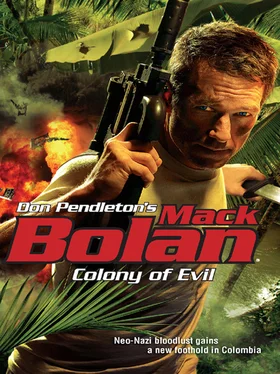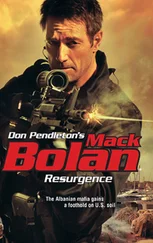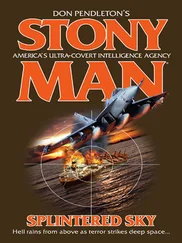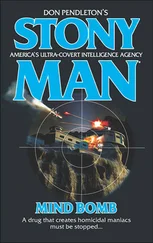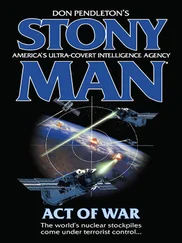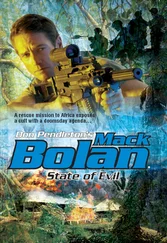Each mission held surprises
Few, if any, ran exactly as the plans were drawn—in quiet moments, prior to contact with the enemy. Whether you called it chaos theory or the human element, it all came down to the same thing: variables that could never be anticipated.
Mack Bolan had stayed alive this long because he planned ahead and still retained the flexibility required to change his plans, adapt to any given situation that arose. Some day, he knew, the switch would be too fast for him, his enemy too deadly accurate, and that would be the end.
But hopefully, it wouldn’t be this night.
He understood that there was too much riding on his mission to Colombia, too many lives at risk if he should fail. His own fate was of less concern to Bolan than the job at hand, but he could hardly carry out that job if he was dead.
That wasn’t part of the plan.
Mack Bolan ®

www.mirabooks.co.uk
Special thanks and acknowledgment to Mike Newton for his contribution to this work.
At least two-thirds of our miseries spring from human stupidity, human malice and those great motivators and justifiers of malice and stupidity, idealism, dogmatism and proselytizing zeal on behalf of religious or political idols.
—Aldous Huxley,
Tomorrow and Tomorrow and Tomorrow
Fanatics never learn. They never change. Defeat in argument or battle doesn’t faze them. Time has no impact on their beliefs or tactics. When they go too far, the only thing that works is cleansing fire.
—Mack Bolan
To Senator James Webb, for courage under fire in
Vietnam and Washington, D.C.
PROLOGUE
CHAPTER ONE
CHAPTER TWO
CHAPTER THREE
CHAPTER FOUR
CHAPTER FIVE
CHAPTER SIX
CHAPTER SEVEN
CHAPTER EIGHT
CHAPTER NINE
CHAPTER TEN
CHAPTER ELEVEN
CHAPTER TWELVE
CHAPTER THIRTEEN
CHAPTER FOURTEEN
CHAPTER FIFTEEN
CHAPTER SIXTEEN
CHAPTER SEVENTEEN
EPILOGUE
Park Avenue, New York City
The man had proved untouchable; his wife was not. The man—the real target—employed security devices and armed guards, remained inside his consulate whenever possible, and generally lived as if his life was constantly at risk.
In that belief, he was correct.
The trackers had considered sniper rifles, car bombs, even rocket launchers, but they ultimately realized that an assault against the consulate itself would likely guarantee their own deaths, while their target had a good chance of emerging from the blitz unscathed. They found that prospect unacceptable, and so adjusted their approach.
The target’s wife was reasonably pretty, undeniably vivacious, and would not allow herself to be penned up inside drab walls simply because her husband was afraid. She had been hoping, even praying, for the diplomatic posting to New York, and she was not about to waste a moment of her golden opportunity. There were too many stores, boutiques, salons, spas, theaters, cafés—the list was endless, and she meant to try them all before they were recalled to Tel Aviv.
That afternoon she needed jewelry, and she refused to have samples delivered to the consulate. Why suffer a parade of fawning salesmen when she could go out and visit them, have lunch, enjoy herself in the heart of Manhattan?
The trackers watched and waited, mingling with the sidewalk crowd. They were dressed down to fit the setting, pass for tourists, and the woman’s driver didn’t seem to notice them.
Her single bodyguard was first to leave the jeweler’s shop, scanning the street before he beckoned to his charge. The woman followed, carrying a small black satin bag and chatting, distracting her protector when he should have been alert.
The trackers moved together, one drawing a pistol, firing at the bodyguard from point-blank range, then spinning toward the black Mercedes at the curb and bouncing three rounds off its windshield. If the driver chose to save himself, he had to stay inside the car.
The second tracker pulled a clear glass bottle from his pocket, twisted off the cap and hurled its contents at the woman’s startled, screaming face. The tone of her screams changed immediately, from a note of panic to soul-searing agony.
The trackers fled and within heartbeats had been swallowed by the crowd.
Sonora, Mexico
THE BUS HAD BROKEN DOWN again, which meant the tour would be late arriving at the stop in Hermosillo. The hotel was not a problem, and the Mexican tradition of late dining meant they wouldn’t starve, but food was not Eli Dayan’s primary focus.
He was tired of traveling and wondered why he’d let his wife persuade him that a Mexican vacation was a good idea.
The kibbutz where they lived was in a desert, and he’d flown halfway around the world to see more desert through the tinted windows of a bus that suffered some mechanical disruption every day, like clockwork. He was tired of cactus, tired of rural villages that seemed to be constructed out of mud and cast-off refuse, tired of drinking beer because he couldn’t trust the water.
His bowels were grumbling, and he reckoned that he was about to suffer the revenge of Montezuma. It would make the last five days of their grand tour a misery, and something told him that his wife would never forgive him.
The bus was slowing. Mouthing a silent curse, Dayan wondered what the excuse would be this time. A flat tire? Had the lazy driver failed to fill the diesel tank that morning?
“What is this? Why are we stopping?” Hilda, his wife, asked him.
“How should I know?”
“Well, find out!”
“They’ll tell us, if it’s anything important.”
They were stopped now, and he heard the front doors open with a hiss. Two men in military jackets, wearing black ski masks, stood near the driver. Both held rifles Dayan recognized as folding-stock Kalashnikovs.
“What is it! What’s this all about!” Hilda demanded.
“Shut your mouth, woman, before you get us killed!”
On of the gunmen spoke, his accent strange to Dayan’s ears. “Your trip ends here,” he said, smiling behind the horizontal slit that showed his lips. “If you know any prayers, this is the time to call upon your god.”
Miami Beach, Florida
THE DAY HAD STARTED WELL for Ira Margulies. He’d closed the deal on Morrow Island, all two hundred million dollars of it, and his personal commission was a cool three million. His clients on both sides of the transaction were well pleased, and he could almost smell the leather seats in the new Maserati that he planned to buy.
Who said a man of fiftysomething was too old to play with toys?
His brief stop at the strip mall on Dade Boulevard did not involve his business. It was strictly personal. The storefront that he entered, darting from his car at curbside to the swinging door through scalding tropic heat, was one of half a dozen mail drops where he kept post boxes under different names.
Why not? It was entirely legal, and the correspondence he received, while not fit for wife or children to peruse, made his days—and nights—more pleasant. After long days at the office, he enjoyed a little something on the side, and in these days of killer viruses, the safest sex of all was solitary.
He was out again in less than sixty seconds, carrying a package and six envelopes in his left hand. He barely registered the movement on his left, until a man’s voice asked him, “Ira? Is that you?”
Читать дальше
